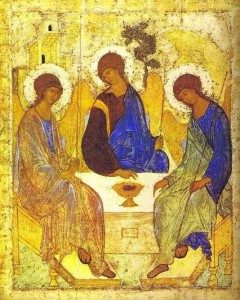Christianity and God – Jane Brooke
For both Judaism and Christianity the basis for the concept of God is monotheism (one God). Abraham, one of the patriarchs, questioned the existence of many gods such as a moon or sun god and determined that there was only one. One of the meanings behind the creation accounts in Genesis is that there is only one creator God to be worshipped.
The God of the Old Testament is a God who is spoken of as the creator, the sustainer and the redeemer of the world. God permits all things and is revealed through people such as Moses and the prophets. God wants to form a covenant (two-way promise) with humanity and is seen as active and present in the world as demonstrated when Moses speaks to a voice from the burning bush (Exodus Chapter 3). The voice gives the name ‘I am..’ , an active verb rather than a noun.
God in the New Testament relates more intimately to people in the form of Jesus. God is incarnate in the world, revealed in the world and redeems humanity through the man Jesus. The old covenants are replaced by the new covenant which Jesus makes at the last supper.
The Council of Chalcedon was a turning point in stating explicitly the church’s understanding of the nature of God and of Jesus Christ. It was held from October 8 to November 1, AD 451, at Chalcedon in Asia Minor. It marked the separation of the Eastern and Western Church with the western church accepting the ‘Chalcedonian Definition’ which stated that Christ has two natures: both divine and human.
Some of the characteristics of the Christian God may be seen as:
- God as creator. God’s word brings order out of chaos into the world. God is living and working in and through every aspect of the world as well as continually creating (immanent).
- God as an omniscient (all knowing) being. Some Christians consider God knows everything whilst others would say that although God works in and through the world, God does not know the future.
- God as love. God’s love is demonstrated in the crucifixion of Jesus which embodies a self giving, sacrificial love. This love is not just passion but includes ethical commitment and justice.
- God as holy. The Lord’s prayer speaks of the intimacy of a father (Abba) and the holiness of God: ‘Our father which art in heaven, hallowed be thy name’.
The Council of Nicea in 325 (from which came the Nicene Creed), based around the Trinity, helped Christians to understand the nature of God in three parts: the Trinity. God is understood as God the Father, God the Son and God the Holy Spirit. St Patrick famously used a shamrock as a visual aid to explain how uniting all three aspects constitute the one God.
Christians understand God relationally and communication through prayer centres around the living presence of God.
God is understood as:
- a creator God with the closeness of a father.
- a son where Jesus’ love is shown in his living and dying upon the cross.
- the holy spirit which is an unseen but strongly felt presence within people directing and challenging decisions and actions.

Rublev’s icon of the three visitors to Abraham, painted in the fifteenth century shows a graceful representation of the Trinity where all three elements incline to each other whilst keeping their own identity. God the Father on the left leans towards God the Son in the centre and God the Holy Spirit leans towards them both. They are seated around a table holding a wafer and a chalice representing the death of Jesus and holy communion. The icon leaves a space for the onlooker inviting them to be seated and to eat the meal. Christians understand themselves as entering into a relationship with the Trinity through worship and prayer.
Christians pray daily in a personal and intimate way to God as Abba: the conversation is two way as they wait on God to reply. Christians seek the love that has been revealed in the death of Jesus knowing that regardless of their mistakes, God’s love is sufficiently gracious and great to forgive them. Rublev’s icon shows how Christians understand, relate and love the triune God in a personal way.
St Augustine speaks of an innate longing to eat at the table and to be in the presence of God: it is only when Christians have searched and found such presence, that they find peace.
‘You have made us for yourself, O Lord, and our heart is restless until it rests in you’ (Augustine).
Main source: Mills, Watson E. (General Editor) 1998. The Lutterworth Dictionary of the Bible. Lutterworth Press, especially the William Hendricks article on God.